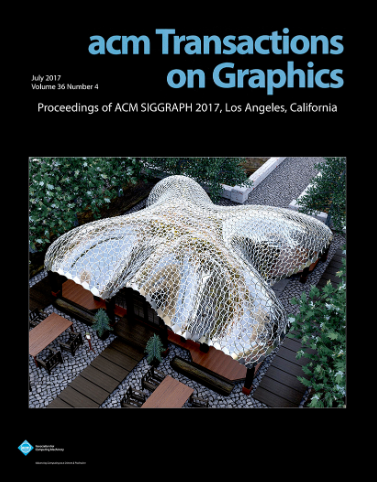潜在的l系统:基于变压器的树生成器
IF 9.5
1区 计算机科学
Q1 COMPUTER SCIENCE, SOFTWARE ENGINEERING
引用次数: 0
摘要
我们通过引入一种新的基于深度学习的框架来生成表示为林登梅尔系统(l -系统)字符串的3D生物树模型,展示了Transformer如何编码分层树状字符串结构。l系统是字符串重写过程系统,它对树的拓扑结构和几何结构进行编码。l -系统是高效的,但是创建生产规则是妨碍它们在实践中使用的最关键的问题之一。我们用深度神经模型代替程序规则的创建。我们不是编写规则,而是训练一个产生输出字符串的深度神经模型。我们在155k树几何形状上训练我们的模型,这些几何形状被编码为l字符串,去参数化,并转换为对应分支的线性序列层次结构。然后,一个具有注意机制的端到端深度学习模型从输入中学习几何运算和分支的分布,有效地取代l -系统重写规则生成。经过训练的深度模型生成新的l -字符串,表示3D树模型,与l -系统提供起始字符串的方式相同。我们的模型允许生成各种各样的新树,深度模型在分支角度上与输入的一致性为93.7%,在分支长度上为97.2%,在提取的几何特征列表上为92.3%。我们还使用感知度量来验证生成的树,显示与输入几何模型的一致性为97%。本文章由计算机程序翻译,如有差异,请以英文原文为准。
Latent L-systems: Transformer-based Tree Generator
We show how a Transformer can encode hierarchical tree-like string structures by introducing a new deep learning-based framework for generating 3D biological tree models represented as Lindenmayer system (L-system) strings. L-systems are string-rewriting procedural systems that encode tree topology and geometry. L-systems are efficient, but creating the production rules is one of the most critical problems precluding their usage in practice. We substitute the procedural rules creation with a deep neural model. Instead of writing the rules, we train a deep neural model that produces the output strings. We train our model on 155k tree geometries that are encoded as L-strings, de-parameterized, and converted to a hierarchy of linear sequences corresponding to branches. An end-to-end deep learning model with an attention mechanism then learns the distributions of geometric operations and branches from the input, effectively replacing the L-system rewriting rule generation. The trained deep model generates new L-strings representing 3D tree models in the same way L-systems do by providing the starting string. Our model allows for the generation of a wide variety of new trees, and the deep model agrees with the input by 93.7% in branching angles, 97.2% in branch lengths, and 92.3% in an extracted list of geometric features. We also validate the generated trees using perceptual metrics showing 97% agreement with input geometric models.
求助全文
通过发布文献求助,成功后即可免费获取论文全文。
去求助
来源期刊

ACM Transactions on Graphics
工程技术-计算机:软件工程
CiteScore
14.30
自引率
25.80%
发文量
193
审稿时长
12 months
期刊介绍:
ACM Transactions on Graphics (TOG) is a peer-reviewed scientific journal that aims to disseminate the latest findings of note in the field of computer graphics. It has been published since 1982 by the Association for Computing Machinery. Starting in 2003, all papers accepted for presentation at the annual SIGGRAPH conference are printed in a special summer issue of the journal.
 求助内容:
求助内容: 应助结果提醒方式:
应助结果提醒方式:


